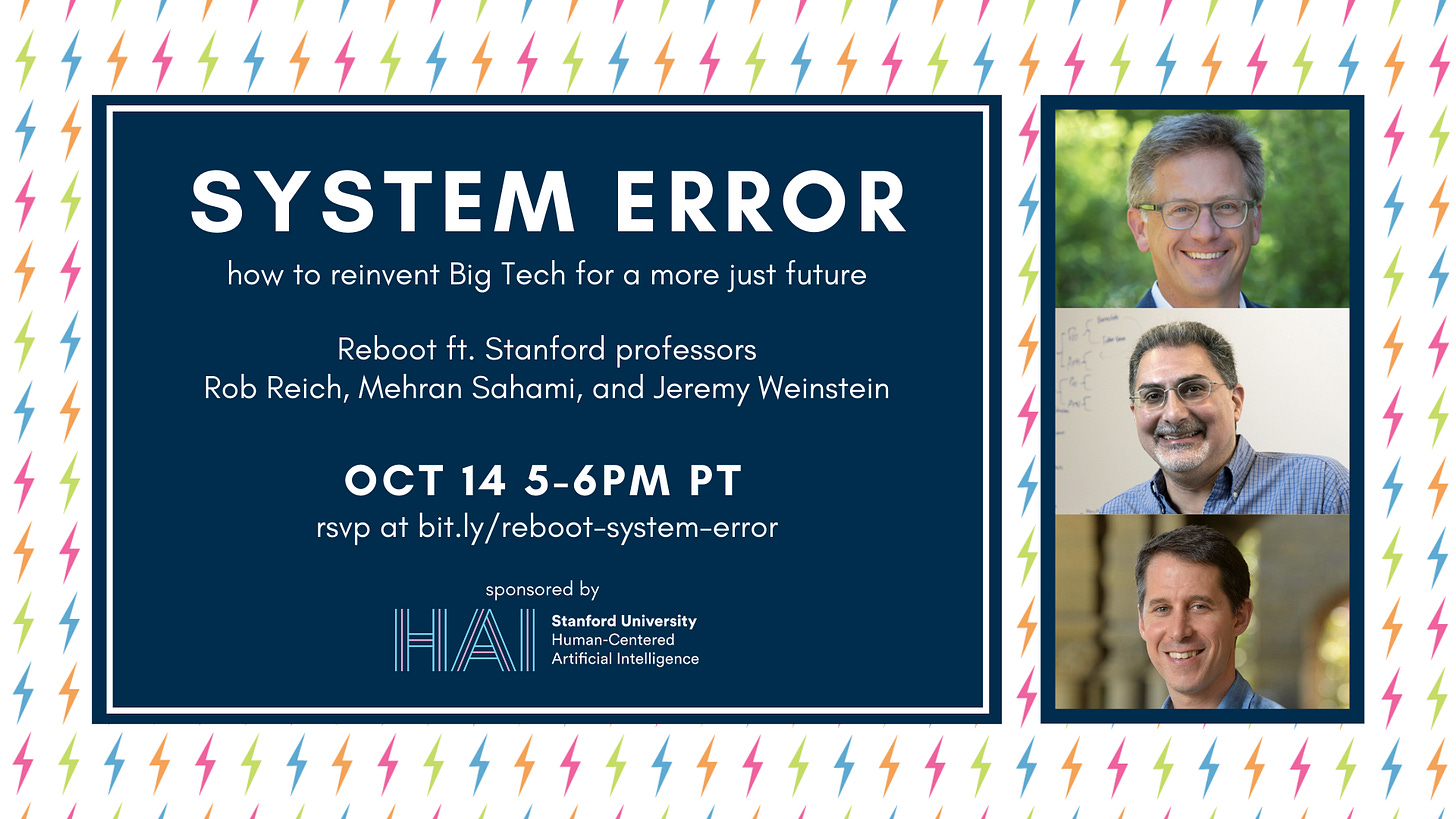Many of you are new to Reboot — welcome! — so here’s a quick recap of what you can expect. Our newsletter publishes guest essays by our community of young technologists, interviews with people fighting for a more just tech future, and public events with authors of the best new books on technology, humanity, and power.
This week, we’re hosting an event and review for System Error, an ambitious, wide-ranging book by three Stanford professors who spent the last several years tackling the challenge of providing ethical training to Silicon Valley’s next generation.
📖 system error by rob reich, mehran sahami, and jeremy weinstein
Our guests for this Thursday, October 14 are Stanford professors Rob Reich, Mehran Sahami, and Jeremy Weinstein.
In System Error: Where Big Tech Went Wrong and How We Can Reboot, three Stanford professors come together for a nuanced overview of the philosophical, technical, and political roots of the tech industry's greatest harms — and a practical menu of solutions for creating a more just and democratic future.
Join us this Thursday for a discipline-spanning Q&A on reinventing the tech industry, from regulation to education and more.
🔊 our take: TA-approved
As a Teaching Assistant in Brown CS’s Socially Responsible Computing program, I spent much of the past two years thinking about how to teach fellow undergraduates about the interactions between tech and society. How could I fully communicate to students our role in broader societal systems, and how those systems influence us?
The short answer is that I couldn’t. But my fellow TAs and I tried to provide as much information as we could. I struggled to find resources that spoke both to technological and societal considerations, and often resorted to assigning articles from news outlets or chapters from books like Algorithms of Oppression, Weapons of Math Destruction, or Artificial Unintelligence. While excellent, these dispersed articles and chapters were far from enough to capture the intricacies of the systems at play in the U.S.’s tech industry and tech academia.
System Error: Where Big Tech Went Wrong and How We Can Reboot is designed to address that very problem. Its trio of authors, Professors Rob Reich, Mehran Sahami, and Jeremy M. Weinstein, based the book on their co-taught course at Stanford, “Ethics, Public Policy, and Technological Change.” Theirs is a rare synthesis of philosophical, computational, and political analyses of the American tech industry. It’s a book whose chapters I’d gladly assign CS students, both beginning and advanced.
This is because the authors attempt to span the whole industry, paying particular attention to how narrow CS education, the profit incentives of venture capital, lackluster regulation, and extensive corporate power have created many of tech’s greatest harms. I especially welcomed their analysis of technologists’ “optimization mindset,” illustrated by the comically hyper-practical development of Soylent. This mindset is important to understand, they argue, simply because it has power behind it. “Now that technologists have become powerful, with their vision and their values about technology remaking our individual lives and societies,” they write, “the problems with optimization have become our problems, too.”
Part II of the book, “Disaggregating the Technologies,” explains four key issues from both technical and political angles: algorithmic decision-making, automation and the future of work, privacy, and free expression. A common thread, extending to Part III of the book, emerges: governments must step in, and soon, via regulation of Big Tech. To the authors, this looks like proactive privacy legislation and antitrust action — a point underscored by the six-hour Facebook blackout just last week and Frances Haugen’s whistleblower report on the company’s unethical, profit-driven behavior.
I agreed with the authors’ policy recommendations, but I think they underemphasized tech companies’ ferocity in resisting proposed regulation. Just this year, in response to a proposal of regulation in Australia, Google threatened to shut down Search in the entire country, while Facebook scrubbed Australian news pages in a bad-faith misinterpretation of the bill. The companies ultimately succeeded in defanging the regulation, making me wonder what may happen in the next few years as a paradigm shift seems so close.
There are a few other areas where I am curious about omissions in the text — for instance, there is no analysis of cryptocurrencies or blockchain technologies as an area of growth, innovation, or regulation. In addition, the authors hardly discuss environmental impacts, despite the energy-intensive nature of training ML and AI systems, which they discuss at length. Of course, it’s impossible to parse every issue in a 250-page book — but I’m excited to ask the authors about their choice of focus.
Let me end by addressing what the book is not: it is neither radically visionary nor nihilistic. It’s this exact middle ground that makes it a useful resource for students and an effective medium to push the conversation beyond the classroom.
🌀 microdoses
If you haven’t, check out Kernel’s prereleases: my manifesto for a progressive techno-optimism, Matthew’s personal-historical exploration of the internet and Asian American identity, and Riley’s (literally) dreamy sci-fi love story.
Stripe Press’s redesigned website is a work of art.
Pinterest whistleblower Ifeoma Ozoma published a comprehensive handbook for tech whistleblowers, including guidance and case studies across legal, media, and security considerations. Not only is the project timely, but it’ll make a serious difference in protecting and encouraging worker advocacy.
A thread on what Facebook’s integrity teams did accomplish.
💝 a closing note
Toward a more just tech industry,
Jasmine & Reboot team






